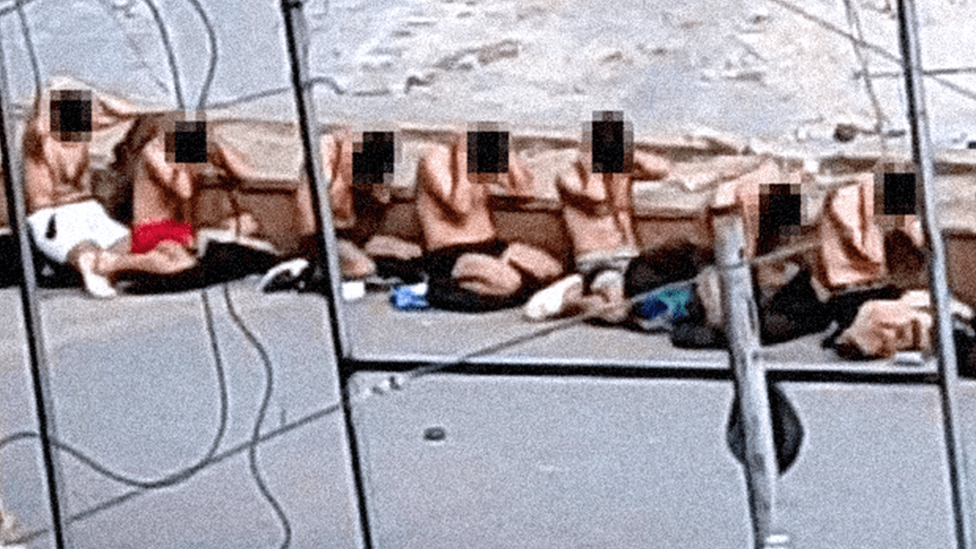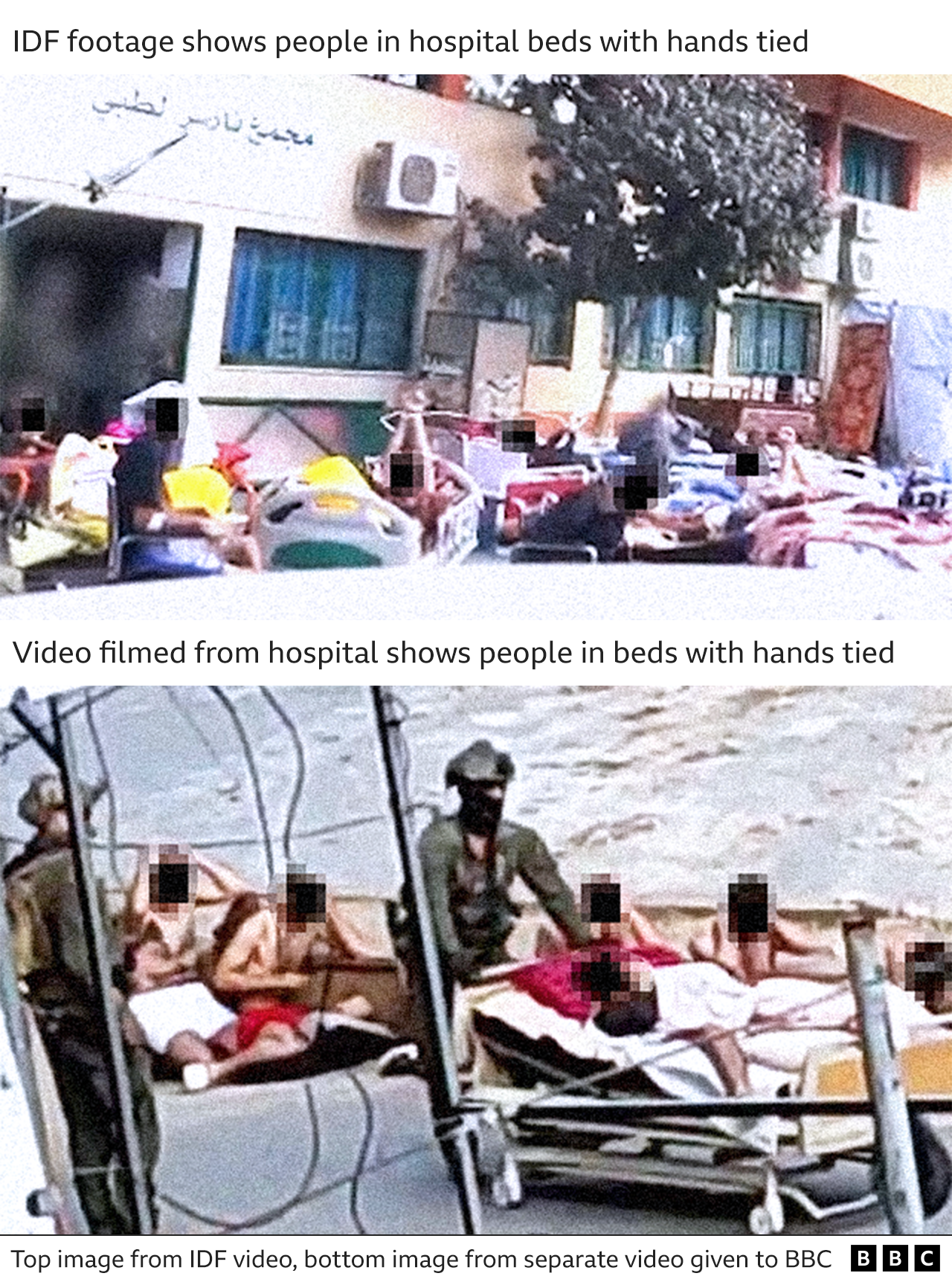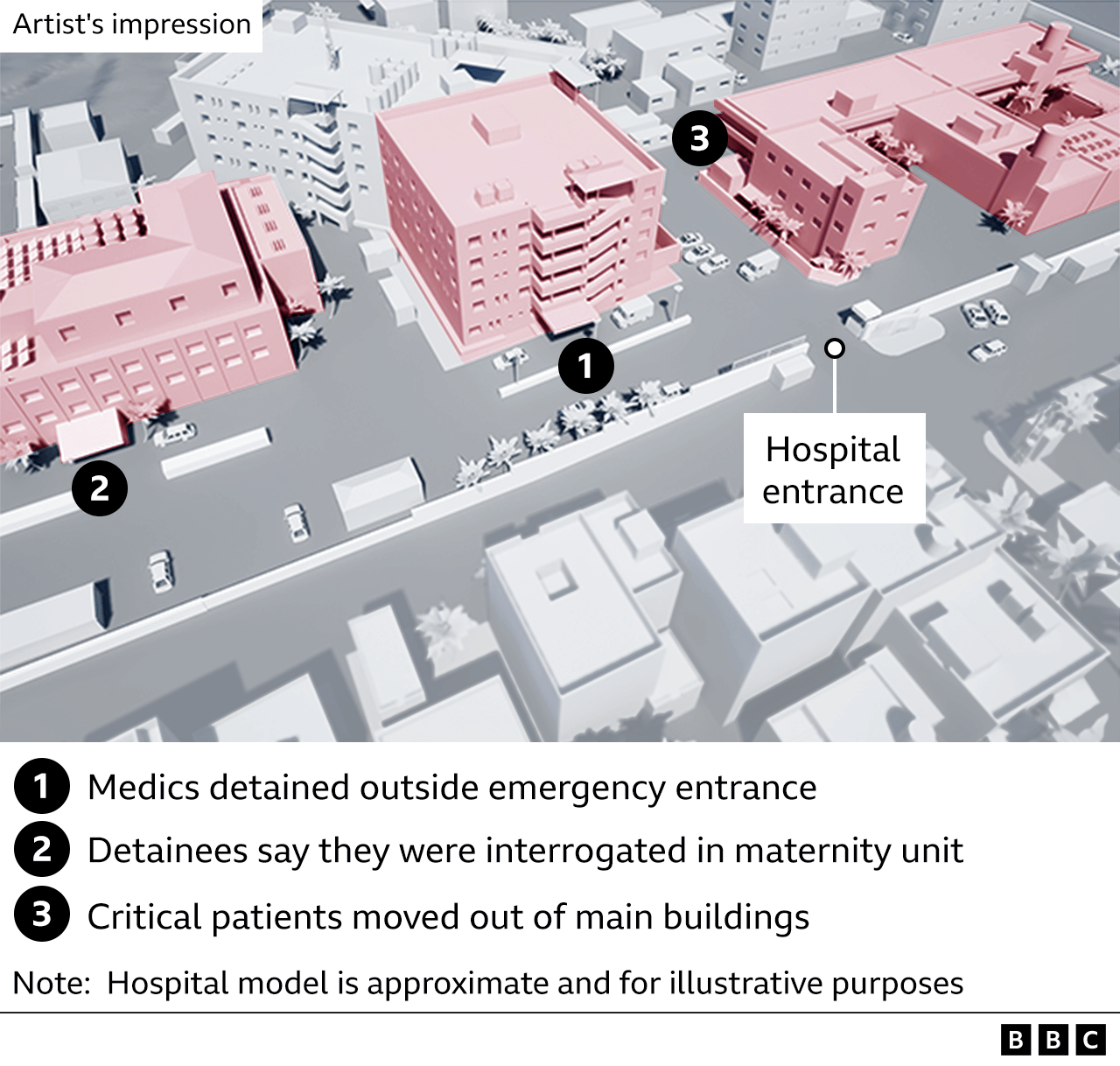Join Date: Feb 2011
Posts: 50,583
Thanks: 28,767
Thanked 14,428 Times in 10,234 Posts
|
 re: Israel Wants UN to CANCEL Palestinian Relief Agency & TFR Control to NEW Agency
re: Israel Wants UN to CANCEL Palestinian Relief Agency & TFR Control to NEW Agency
Gaza Medics Tell BBC Israeli Troops Stripped Beat Tortured and Humiliated Them After Hospital Raid
Palestinian medical staff in Gaza have told the BBC they were blindfolded, detained, forced to strip and repeatedly beaten by Israeli troops after a raid at their hospital last month.
BBC 12 MAR 2024

Ahmed Abu Sabha, a doctor at Nasser hospital, described being held for a week in detention, where, he said, muzzled dogs were set upon him and his hand was broken by an Israeli soldier.
His account closely matches those of two other medics who wanted to remain anonymous for fear of reprisals.
They told the BBC they were humiliated, beaten, doused with cold water, and forced to kneel in uncomfortable positions for hours. They said they were detained for days before being released.
The BBC supplied details of their allegations to the Israel Defense Forces (IDF). They did not respond directly to questions about these accounts, or deny specific claims of mistreatment. But they denied that medical staff were harmed during their operation.
They said that "any abuse of detainees is contrary to IDF orders and is therefore strictly prohibited".
The IDF raided the hospital in the southern Gazan city of Khan Younis - which was one of the few in the Strip still functioning - on 15 February, saying intelligence indicated that the hospital housed Hamas operatives.
They also said Israeli hostages taken by Hamas on 7 October had been held there - and some of the hostages themselves have publicly said they were kept at Nasser. Hamas has denied that its fighters operate inside medical facilities.
Footage secretly filmed in the hospital on 16 February, the day the medics were detained, was shared with the BBC.
It shows a row of men stripped to their underwear in front of the hospital's emergency building, kneeling with their hands behind their heads. Medical robes are lying in front of some of them.
"Anybody who tried to move his head or make any movement got hit," the hospital's general manager, Dr Atef Al-Hout, told the BBC. "They left them for around two hours in this shameful position."
The IDF told the BBC: "As a rule, during the arrest process, it is often necessary for terror suspects to hand over their clothes such that their clothes can be searched and to ensure that they are not concealing explosive vests or other weaponry.
"Clothes are not immediately returned to the detainees, due to the suspicion they may conceal means that can be used for hostile purposes (such as knives). Detainees are given back their clothes when it's possible to do so."
Medical staff said that they were then taken into a hospital building, beaten, and then transported to a detention facility, all while undressed.
Dr Abu Sabha, the 26-year-old newly qualified doctor and volunteer medic at Nasser, described some elements of his treatment while in detention as torture, such as making detainees stand for hours without a break. He said other punishments given to detainees included being made to lie on their stomach for prolonged periods and delaying their meals.
An expert in humanitarian law said the footage and the testimony from the medical staff interviewed by the BBC was "extremely concerning". He said some of the accounts provided to the BBC "very clearly cross over into the category of cruel and inhumane treatment".
Dr Lawrence Hill-Cawthorne, co-director of the Centre for International Law at the University of Bristol, said: "It goes against what has for a long time been a very fundamental idea in the law that applies in armed conflict, which is that hospitals and medical staff are protected."
"The fact that they treat nationals of the enemy side should not in any way undermine their protection," he said.
The BBC has been investigating the hospital's story for several weeks, speaking to doctors, nurses, pharmacists and displaced people camping in the courtyard. We have cross-checked details in these accounts.
We were given the names of 49 Nasser medical personnel said to have been detained. Of those, 26 were named by multiple sources, including medics on the ground, the Hamas-run health ministry, international groups, and the families of those missing.
The three medics who say they were detained and later released have not given their accounts publicly before. They include Dr Abu Sabha, who we interviewed twice. His story remained consistent, and we corroborated key parts of his account independently.
Families of five other medics at the hospital have told the BBC their loved ones are missing. In addition, the International Committee of the Red Cross has confirmed to the BBC that it has received dozens of phone calls from people who say family members, including medics, who were at Nasser, are now missing.

 ‘Without painkillers, we leave patients to scream for hours’
Medics who remained at Nasser say the IDF's operation at the hospital left them unable to care for patients. When the IDF took control, nearly 200 patients were being treated there, many of them "bedridden", including six inside the ICU, according to Dr Hout, the general manager.
‘Without painkillers, we leave patients to scream for hours’
Medics who remained at Nasser say the IDF's operation at the hospital left them unable to care for patients. When the IDF took control, nearly 200 patients were being treated there, many of them "bedridden", including six inside the ICU, according to Dr Hout, the general manager.
Those staff allowed to remain have described being ordered to move seriously ill patients between buildings, being taken away from their duties to be interrogated, and assigned patients whose cases they were not trained to deal with, all as they worked in cramped, unsanitary conditions.
Multiple medics said that 13 patients died in the days after Israel's takeover.
They said many of those patients had died because of the conditions at the hospital, including a lack of electricity, water, and other essentials needed to keep Nasser running. We cannot independently verify this. A doctor shared photos of bodies in bags on beds that we have confirmed were taken in a ward at the hospital.
The IDF told the BBC that it had "provided the hospital with hundreds of food rations and an alternative generator that enabled it to continue functioning and treat the patients within it".
The "essential systems" of the hospital kept functioning during the IDF's operation on an uninterruptible power supply system, it said.
On 18 February, the World Health Organization (WHO) said the hospital was short of food and basic medical supplies, and had ceased to function. The remaining patients were sent to other hospitals around Gaza and the medical staff who worked there left shortly afterwards.
 Doctor: 'I thought I was going to be executed'
Doctor: 'I thought I was going to be executed'
Released detainees and other medics told the BBC that the maternity building, called Mubarak, became the place where the IDF interrogated and beat staff. Dr Abu Sabha said he was initially picked to stay with patients after the raid, but was later taken to Mubarak, which he said had become "more like a torture place".
"They put me on a chair and it was like a gallows," he said. "I heard sounds of ropes, so I thought I was going to be executed.
"After that they broke a bottle and it [the glass] cut my leg and they left it to bleed. Then they started bringing doctor after doctor in and started putting them next to each other. I was hearing their names and their voices."
The IDF told the BBC it "does not and has not carried out mock executions of detainees, and rejects such claims".
Graphic showing parts of Nasser Hospital Complex in Khan Younis where medics say they were detained and interrogated by Israeli forces
All three of the detainees the BBC spoke to said they were crammed onto military vehicles and beaten as they were transported in a large group. Soldiers beat them with sticks, hoses, rifle butts and fists, they said.
"We were naked. Just wearing boxers. They piled us on top of each other. And they took us out of Gaza," one of the medics who wanted to remain anonymous said. "All along the way we were being hit and sworn at and humiliated. And they poured cold water on us".
Dr Abu Sabha said that during the journey, soldiers took the detainees out of the vehicle. "They took us to a patch of ground covered in gravel, forced us to kneel down and our eyes blind-folded… There was a pit in the ground, and we thought they would execute us and bury us here. We all started prayers."
He was then driven to a building where he and the other detainees with him would be held, he said.
The two other released detainees said that at some stage they were given medical checks but no medication. One said that instead of getting treatment for an injury, an IDF soldier hit him where he was injured.

|